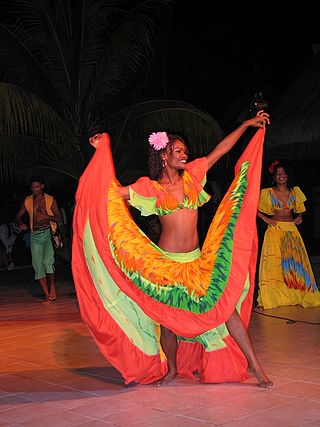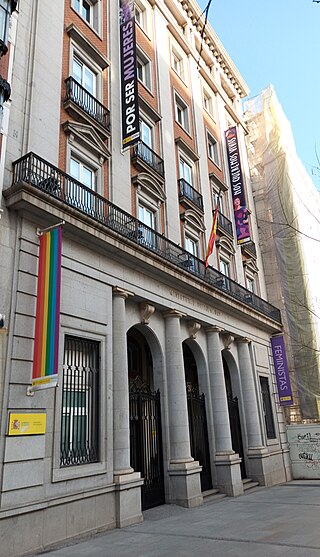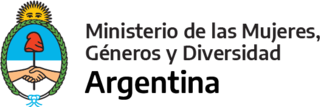Related Research Articles
Gender equality, also known as sexual equality or equality of the sexes, is the state of equal ease of access to resources and opportunities regardless of gender, including economic participation and decision-making; and the state of valuing different behaviors, aspirations and needs equally, regardless of gender.

Afghan Ministry of Women's Affairs (MOWA) was a ministry in the Afghan government which was established in late 2001 by the Afghan Interim Administration.

National Commission on Status of Women (NCSW) is a Pakistani statutory body established by the President Pervez Musharraf, under the XXVI Ordinance dated 17 July 2000. It is an outcome of the national and international commitments of the Government of Pakistan like Beijing Declaration and Platform for Action, 1995; and 1998 National Plan of Action (NPA) for Women, 1998.

Women in Azerbaijan nominally enjoy the same legal rights as men; however, societal discrimination remains a problem. Baku Research Institute reports that: "Violations of privacy in political and social relations, such as interfering in private life, the sharing of private information, and unauthorized access to private space, are widespread in Azerbaijan".

Women in Mauritius refers to the social demographic of women in Mauritius. Women's role in Mauritian society changed throughout the 20th century. Historically, Mauritian culture maintained patriarchal power structures, in domains inclusive of family and work life. Women's contribution in the workforce increased due to the creation of 'Export Processing Zone', by the Mauritian Government. This shift resulted in a surge in 'dual-earner' and working single-mother households.

The status of women in Argentina has changed significantly following the return of democracy in 1983; and they have attained a relatively high level of equality. In the Global Gender Gap Report prepared by the World Economic Forum in 2009, Argentine women ranked 24th among 134 countries studied in terms of their access to resources and opportunities relative to men. They enjoy comparable levels of education, and somewhat higher school enrollment ratios than their male counterparts. They are well integrated in the nation's cultural and intellectual life, though less so in the nation's economy. Their economic clout in relation to men is higher than in most Latin American countries, however, and numerous Argentine women hold top posts in the Argentine corporate world; among the best known are Cris Morena, owner of the television production company by the same name, María Amalia Lacroze de Fortabat, former CEO and majority stakeholder of Loma Negra, the nation's largest cement manufacturer, and Ernestina Herrera de Noble, director of Grupo Clarín, the premier media group in Argentina.
The Ministry of Gender Equality and Family, formerly the Ministry of Gender Equality, is a cabinet-level division of the government of South Korea. It was created on February 28, 1998, as the Presidential Commission on Women's Affairs. The current ministry was formed on January 29, 2001.

Women in Paraguay is a group of women whose rights are challenged in the country of Paraguay. Faced by socioeconomic inequalities and gender pay gap, they experienced significant cultural changes since 1990 as a result of constitutional and legal expansions of women's rights and evolving cultural attitudes. The legal and government institutions currently existing in Paraguay were developed in part through the efforts of feminist organizations in the country that held significant awareness-raising campaigns during the 1990s to formalize the guarantees of women's rights. UN Women supports the Paraguayan State in the challenge to extend women's rights, to fight for gender equality, as well as women's empowerment. It also ensures that women's voices are heard and create more opportunities for women.
Tuvalu is a small island nation in the South Pacific, located North of Fiji and North West of Samoa. The population at the 2012 census was 10,837. Tuvalu has a written constitution which includes a statement of rights influenced by the United Nations Universal Declaration of Human Rights and the European Convention on Human Rights. While most human rights in Tuvalu are respected, areas of concern include women’s rights and freedom of belief, as well as diminishing access to human rights in the face of global warming. The latter has played a major role in the implementation of human rights actions in Tuvalu given its geographical vulnerability and scarce resources.

The Ministry of Equality is a department of the Government of Spain responsible for the proposal and execution of the government's policy on equality, with a focus on making the equality between men and women real and effective as well as prevention and eradication of different forms of violence against women. The department's roles also include eradication of all kind of discrimination by sex, racial and ethnic origin, religion or ideology, sexual orientation, gender identity, age, disability or any other personal or social condition or circumstances. It existed from 2008 to 2010 when it merged with the Ministry of Health, and then from 2020.

Helena Dalli is a Maltese politician serving as European Commissioner for Equality since 1 December 2019. She is a member of the Labour Party.
Gender equality is the notion that each gender should receive equal treatment in all aspects of life, and that one should not be discriminated based on their sex. Gender equality is a human right, which is recognised under the United Nations Universal Declaration of Human Rights (UDHR).
Foreign aid for gender equality in Jordan includes programs funded by governments or non-governmental organizations (NGOs) that aim to empower women, close gender based gaps in opportunity and experience, and promote equal access to education, economic empowerment, and political representation in the Hashemite Kingdom of Jordan.

This article provides an overview of marital rape laws by country.

The Ministry of Women Empowerment and Child Protection (MoWECP) of the Republic of Indonesia, formerly the Ministry of Women's Empowerment of the Republic of Indonesia is a government ministry responsible for the rights and welfare of women and children of Indonesia. The minister is currently I Gusti Ayu Bintang Darmawati since 23 October 2019.
The Government Delegation for Gender Violence is a department of the Secretariat of State for Equality of the Spanish Department of Equality responsible for formulating the central government policy against the different forms of violence against women and promoting, coordinating and advising on all the measures carried out in this matter.

The Ministry of Women, Genders and Diversity is a ministry of the Argentine Government tasked with overseeing the country's public policies on issues affecting women and gender and sexual minorities. The ministry was created in 2019, as one of the initial measures of President Alberto Fernández; the first and current minister is Elizabeth Gómez Alcorta.
Feminist foreign policy, or feminist diplomacy, is a strategy integrated into the policies and practices of a state to promote gender equality, and to help improve women's access to resources, basic human rights, and political participation. It can often be bucketed into three categories: rights, resources, and representation. The concept was first coined and integrated into governmental policy by Margot Wallström, former Swedish Foreign Affairs Minister.
Sonia Brucke Romero is a Paraguayan civil servant. Since 2006 she has served the Senate of Paraguay as Director of the Commission for Equality, Gender and Social Development.
The Ministry of Women, formerly the National Secretariat of Politics for Women, was created as a secretariat with cabinet-level during the first Lula da Silva administration, as a way to ensure that politics for women could have more attention. In 2019, it was fused with the Ministry of Human Rights and became the Ministry of Woman, Family and Human Rights (MMFDH), with an attribution to establish public politics for the enhancement of life of all women, LGBT people, indigenous people, black people of Brazil. The main goal of the Ministry is "[to] promote the equality between men and women and fight against any kind of prejudice and discrimination inherited from a patriarchal and excluding society."
References
- ↑ "Quién es Celina Lezcano Flores, la nueva ministra de la Mujer". La Nacíon (in Spanish). 9 March 2021. Retrieved 29 August 2021.
- ↑ Inter-American Commission of Human Rights (9 March 2021). "Third Report on the Situation of Human Rights in Paraguay". Organization of American States.
- ↑ Committee on the Elimination of Discrimination against Women (2017). "Concluding observations on the seventh periodic report of Paraguay" . Retrieved 28 August 2021.
- ↑ "Paraguay 2013 Human Right Report" (PDF).
- ↑ "Regional report on the review of the Beijing Declaration and Platform for Action in Latin American and Caribbean countries, 25 years on" (PDF). Retrieved 28 August 2021.
- ↑ "IV Plan Nacional de Igualdad 2018 – 2024 IV National Equality Plan 2018 - 2024". UNESCO .